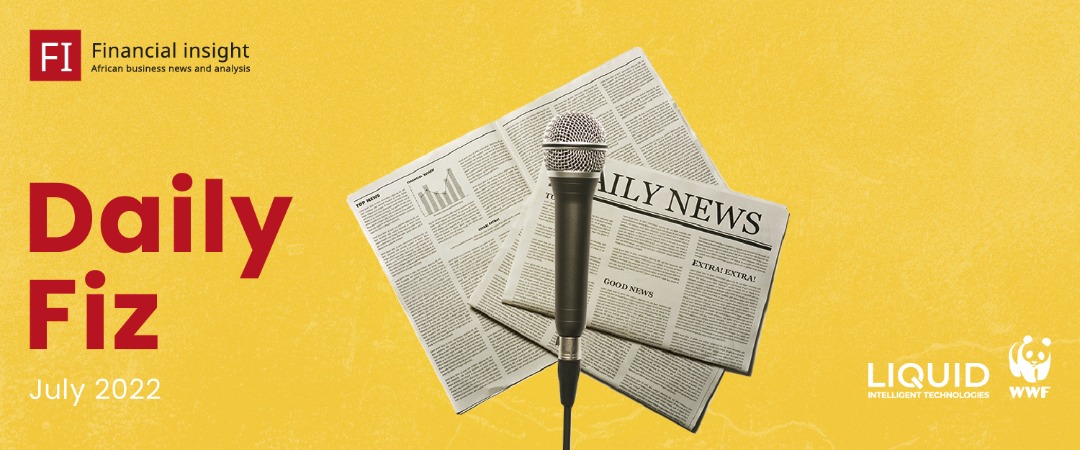Good morning. Here’s what you need to know
-
ActionAid faults IMF, World Bank policies, calls for cancellation of debts owed by Zambia
-
FTSE 100 stock index closes at new all-time high
-
High global food prices may finally see a bottom in 2024, says Oxford Economics
In Local Business and Finance News
Zambia is on the cusp of completing a deal to restructure its debt amounting to US$13.4 billion, a process the Southern African nation pursued in 2021 following its default on debt obligations. In a wave, the sovereign credit ratings through Moody’s, Fitch and other rating agencies’ lenses worsened from B+ (Highly speculative) since 2015 to RD (Restricted Default) by 2020. Despite successes in the Eurobond market, Zambia has never exceeded the B+ rank, making “highly speculative” its highest rating since 2011. This article will highlight Zambia’s debt status, the agreements made with the creditors and the catch in the deals. Read more on Financial Insight
ActionAid USA has called for the cancelation of Zambia and other African countries’ debt to help free up the finances needed to build resilience to climate impacts. Niranjali Amerasinghe, Country Director of ActionAid USA, also noted the need to overhaul the international financial architecture with a proper debt workout mechanism. In a statement issued in Lusaka on Monday after concluding their Spring meetings in Washington DC, Amerasinghe said this was to ensure global South governments had a say over policies impacting them disproportionately. She noted that global South countries had been pushed further into debt and are reeling from the impacts of International Monetary Fund (IMF)-imposed austerity measures. She said austerity measures had blocked the recruitment of teachers, doctors and nurses, even in countries with severe shortages and had squeezed public sector salaries at a time of a rising cost of living. Amerasinghe added that Kristalina Georgieva’s appointment at the IMF as Managing Director was a continuation of the colonial era of ‘gentleman’s agreement’, where rich western powers had the most say. Read more: Zambia Monitor
Zambia’s state-owned electricity utility Zesco said on Monday it is seeking to import power to avert an energy deficit that could affect output in Africa’s second-largest copper producer. The southern African country generates 86% of its electricity from hydropower stations. Power generation has been hit by a severe drought induced by El Nino – a weather phenomenon resulting from the abnormal warming of the waters in the eastern Pacific, which raises temperatures globally. As a result, Zambia expects a power generation deficit of 700 megawatts this year, Zesco said in a statement. “We are negotiating additional electricity imports that will be strategically allocated to crucial sectors, including mining, agriculture, and manufacturing to support economic stability and growth,” Zesco said. It did not give details of how much power it seeks to import. Last week, Zesco warned mining companies there may be fluctuations in power supply due to the reduced generation capacity, raising concern over the country’s copper output. Read more: Reuters
The Food Reserve Agency (FRA) has received about 6,080.73 metric tonnes of white maize from commercial farmers contracted to grow the commodity under the Early Maize Programme. This followed the launch of the Early Maize Programme harvest last month by President Hakainde Hichilema. FRA Public Relations Coordinator, John Chipandwe, said 55 commercial farmers were contracted to grow maize as a response to the drought situation Zambia was currently facing. Chipandwe in a statement issued on Sunday said the over 6,000 metric tonnes of non-genetically modified Grade A white maize, equivalent to more than 121,000 Kilogramme bags of white maize had been delivered to the FRA. “The Agency targets to purchase a total of 146,000 metric tonnes under the Early Maize Programme and as at April 19, 2024, 6,070. 73 metric tonnes of maize was delivered. The balance is expected to be delivered by end of June this year,” he said. Read more: Zambia Monitor
In International News
The IMF warned that the Nigeria’s economy could be at risk if it simply fails to produce. During the African Department April 2024 Press Briefing, the Director of, the African Department International Monetary Fund, Abebe Aemro Selassie was asked about what he could recommend for the Nigerian economy as it relates to the Naira being in free fall. He responded, stating, “I think Nigeria first and foremost needs to diversify its economy. Second, this also applies to the resources that the government relies on, which is, too much excessively on oil and not enough on non-oil revenue.” He added; “For a country like Nigeria, Africa’s most populous country with all of those development spending needs, we think it is problematic that tax revenue to GDP is only 8-9 percent when it should be a lot higher so that more resources can be spent on building universities, on building infrastructure.” Speaking on suggestions for policies the country can implement, the IMF director noted that it is completely up to Nigerians, and its government. “First and foremost, this is for the people of Nigeria, the government of Nigeria, to choose. We have provided advice in terms of what the ideal mix of policies would be. And just to be clear, we have many reports on this,” the director stated. Read more: Business Insider
The FTSE 100 stock index of the UK’s biggest publicly-listed companies has reached a new record closing price. The fresh all-time high was driven by a weaker pound and easing tensions in the Middle East. The index closed on Monday at 8,023.87 points to mark the new record, surpassing its previous high of 8,012.53 in February last year. It was up 1.62% at its close, with retailers M&S, Tesco, Sainsbury’s and Ocado among the big risers of the day. Shares have benefitted from a weaker pound because the index on the London Stock Exchange has many firms with big footprints overseas. A weak pound makes goods they export cheaper for foreign buyers and helps inflate the value of business done elsewhere. Read more: BBC News
Japan’s factory activity contracted but approached the break-even point in April, a business survey showed on Tuesday, suggesting the key sector is finally picking up after months of sluggishness. The au Jibun Bank flash Japan manufacturing purchasing managers’ index (PMI) rose to 49.9 in April from 48.2 in March, remaining below the 50.0 threshold separating growth from contraction for 11 straight months. Still, the index was closest to the break-even level since slipping into contraction in June, the data showed. “While the service sector remained the primary driver of growth, it was encouraging to see the deterioration in manufacturing output further ease in April,” said Jingyi Pan, economics associate director at S&P Global Market Intelligence, which compiled the survey. The output and new orders, the two key subindexes contributing to the headline figure, contracted at the slowest pace in six and 10 months, respectively. Reuters
Rising food prices around the world may finally be seeing a bottom this year. According to Oxford Economics, global food prices are expected to decline in 2024, offering some relief for shoppers. “Our baseline forecast is for world food commodity prices to register an annual decline this year, reducing pressure on food retail prices further downstream,” the economic advisory firm wrote in a recent note. The key driving force behind the decline in food commodity prices is the “abundant supply” for many important crops, especially wheat and maize. Bumper harvests in recent months for both staple crops led to a steady decline in prices. Wheat futures have fallen almost 10% year-to-date, while maize futures lost about 6% over the same period, according to FactSet data. Farmers ramped up production of both wheat and corn grains following higher prices after Russia began its invasion of Ukraine in 2022. As a result, global maize harvests for the marketing year ending August this year are likely to come in at record levels, according to Oxford’s analysis. Wheat harvests are also forecast to come in high, although slightly lower than the record level in marketing year 2022 to 2023, the Oxford report said. Read more: CNBC








